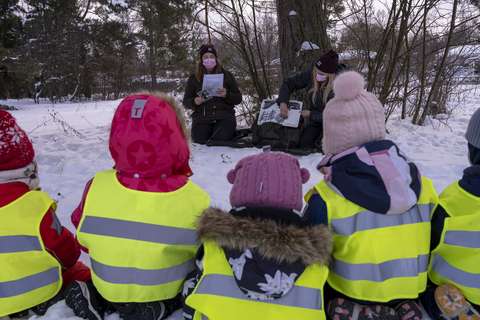We encourage children and young people to read throughout their learning path

Literacy is a key factor in promoting sustainable development. The fourth UN Sustainable Development Goal is to ensure inclusive and equitable quality education and promote lifelong learning opportunities for all. Our Growth and Learning Sector supports children’s and young people’s literacy throughout their entire learning path.
Strong literacy skills are not only the basis for learning, but also the right of every child and young person. The National Literacy Strategy 2030 states that diverse literacy skills are the foundation of a safe society, functioning democracy and equality. The PISA results published at the end of last year demonstrate the importance of reading comprehension.
Children’s literacy skills are strengthened during early childhood education and care and pre-primary education. This means skills that are essential for learning how to read and write. These include recognising sounds in a word and linguistic memory.
In grades 1–2, teaching focuses on creating a foundation for good reading and writing skills. The pupils learn to read and practise text comprehension skills.
As compulsory education now continues after the age of 15, pupils may and have the time to repeat grade 2, if necessary, if their literacy skills need to be improved in order to digest the contents of grade 3 subjects. Reading should be smooth by the end of grade 3.
Children’s data will be transferred more efficiently from pre-primary education to basic education
The share of children and young people with poor literacy skills has increased in recent years. We want to ensure that no-one falls off their path of growth and learning, and that is why we are preparing a more effective cooperation model between pre-primary education and basic education.
With this, we can ensure that 1st grade teachers know the learning skills and capabilities of children coming from preschool to their class in advance, including their literacy skills. This way, the teacher can support the development of pupils’ literacy while taking individual needs into account, in cooperation with their guardians.
Reading as part of the learning path
Day-care centres, schools and general upper secondary schools cooperate closely with libraries. For example, Espoo City Library offers early childhood education and care groups experiences alongside with books. Cooperation with libraries supports especially linguistic development and reading skills.
Books and their diverse world support not only linguistic skills and imagination but also the development of emotional skills. Reading aloud and listening to a story together with their own early childhood education and care group and a safe adult is also important for children. Libraries also offer story times both in the library and online. During multilingual story times, children have the opportunity to improve their proficiency in both their mother tongue and Finnish or Swedish.
Espoo general upper secondary schools have developed a media library, which will be updated for national use. The media library is intended for Finnish-language general upper secondary education to support language-aware teaching. Each general upper secondary school in Espoo has also been provided with a book cart complete with books purchased from the Kierrätyskeskus recycling centre. Students may bring their own books, borrow and read books from the book cart and then return them for others to read. Young people are also encouraged to share their experiences reading the books they have borrowed on social media.
What on earth is KULPS?
The KULPS culture and sports path is a unique system invented in Espoo, the goal of which is to promote equality between children and young people and develop the use of culture and sports services for learning.
As part of the KULPS library path, the library offers a fairy tale coding session or a friendship session to pupils in pre-primary education. Both sessions include an active section where children can participate in creating the story themselves. The core of library pedagogy is discovering one’s own creativity and realising that the world of stories is for everyone.
For basic education and upper secondary education, the KULPS library path offers versatile guided and independent library visits. The focus is on nurturing reading enthusiasm and media education. Diverse literacy skills are a key civic skill in today’s society, and they can only be developed by reading.
The main focus of media education is developing one’s own thinking skills and critical attitude and the courage to act in the world of multimedia. The aim is to provide pupils and students with tools for acting responsibly, constructively and creatively in different media and to develop critical thinking skills, especially in order to understand the different ways others aim to influence them.
Libraries’ versatile offerings for families
Libraries also organise memorable music sessions and concerts for the whole family. Fairy tale yoga is available around Espoo in a rotating manner. Similarly, the independent Peek into Espoo Routes encourage residents to familiarise themselves with their city and their surroundings through stories.